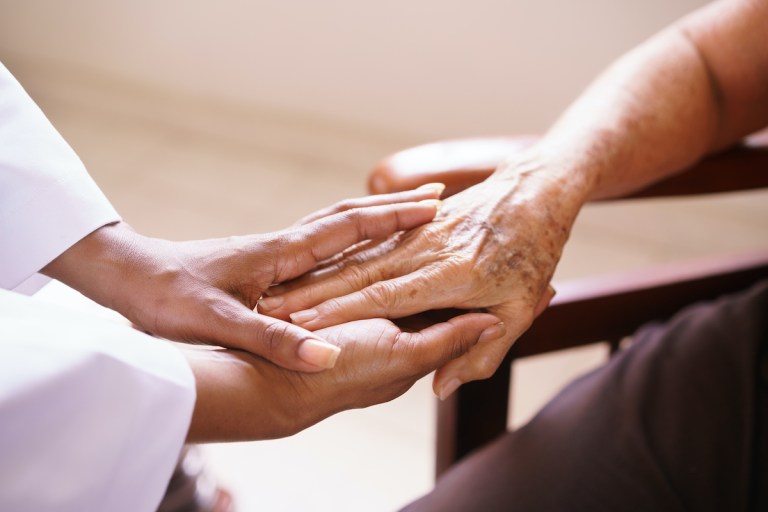Side Effects of Walking Just 10 Minutes Per Day, Says Science
Here's how taking brief but brisk walks can help your focus, self-confidence, and lifespan.


Walking is one of the simplest, easiest, and most affordable workouts you can do. And though there exist some negative side effects associated with walking—if you’re maintaining poor form and walking in the wrong places at the wrong times, they include neck, shoulder, shin, and hip pain, as well as an overall fitness level that plateaus too easily—the pros obviously far outweigh the cons when it comes to strolling and marching your way to a leaner figure and better cardiovascular fitness.
While many health experts preach the benefits of taking longer walks every day with the goal of reaching 10,000 steps, the truth is you can benefit from taking much shorter walks—especially if that’s all your busy schedule will allow. “A brisk 10-minute daily walk has lots of health benefits and counts towards your recommended 150 minutes of weekly exercise,” say the health experts at the UK’s National Health Service.
1. You’ll Gain Self-Confidence


If you’d like a quick mental-health jolt, consider taking a quick fast-paced stroll around your neighborhood. A 2016 study published in the journal Emotionfound that, compared to sitting, walking for just 12 minutes at a time led to greater attentiveness, self-confidence, and enhanced feelings of vigor and joviality. (So if you’re going out for a 10-minute walk, consider tacking on an extra two minutes!) And for some great tips for walking better, see here for The Secret Trick for Walking for Exercise, According to Health Experts at Harvard University.
2. You’ll Reduce Your Risk of Death by 15%


The leading health authorities at Public Health England (PHE) and the Royal College of GPs say that taking 10-minute brisk walks every day, which are defined as a walk that is fast enough that you can talk but you “can’t sing,” can shave your risk of early death by 15%.
Also Read: https://arbiterz.com/super-exercise-walking-makes-us-healthier-happier-and-brainier/
“I’d advise anyone of any age and activity level to start to fit in at least one 10-minute brisk walk a day as a simple way to get more active, especially those who may be taking medication for a long-term health condition—you will receive even more benefits from walking briskly for 10 minutes or more a day,” explained Muir Gray, a noted physician and professor in the UK.
3. You’ll Be More Focused


A study of college students published in Proceedings of the National Academy of Sciences required the study participants to perform exercises such as 10-minute brisk walks. They found that a single bout of short exercise went a long way toward a healthier brain, as participants immediately showed much better memory performance and focus on cognitive tests.
“The findings show that exercise can change people’s brains and minds right away,” observed The New York Times, “without requiring weeks of working out. Even better, the exertion required can be so slight as to allow almost anyone, even those who are out of shape or possibly disabled, to complete the exercise. And for advice on walking properly, make sure you know the Major Mistakes You Should Never Make While Walking, Say Experts.
4. You’ll Improve Your Blood Flow


According to an article in Prevention, walking for just 10 minutes per day can do wonders for your circulation and your arteries. “Six hours of sitting [every day] restricts blood flow to your legs, which may up your risk for arterial disease, a precursor for heart attack or stroke. Just 10 minutes of walking may protect you,” they advise.
5. You’ll Burn More Calories


If you weight 130 pounds and walk at a pace of 4mph, which is defined as a “very brisk” walk, you’ll burn roughly 50 calories during a 10-minute walk. Walking just once-per-day for a week would result in 350 calories burned. However, if you start multiplying your walks daily—let’s say you take 3 10-minute walks per day—you’ll be burning more than 1,050 calories every week.
6. You’ll Reset Your Circadian Rhythm—and Sleep Better


One important caveat here: You’ll need to get in your walk early in the morning, or within two hours of getting up, according to Michael Mosley, MD, the science journalist and host of the BBC Radio 4 podcast titled “Just One Thing.” He says that exposing yourself to early morning light will pay serious dividends to your sleep later that day.
Also Read: https://arbiterz.com/intermittent-fasting-if-youre-struggling-to-lose-weight-this-might-be-why/
“Because our clocks run longer than 24 hours, it’s important to reset your body clock every morning with exposure to the morning’s blue light, which our receptors are especially sensitive to,” said Mosley in a recent episode. “Light helps to reset our internal body clock. Exposure to light also suppresses the production of melatonin, the hormone that encourages us to go to sleep.”
7. You’ll Instantly Lower Your Blood Sugar


This is definitely the case if you head out for your walk after downing a large meal. According to a study of people who suffer from Type-2 diabetes, which was published in 2016 in the journal Diabetologia, a 10-minute walk after eating a meal helped test subjects lower their blood sugar levels. And to make sure you’re wearing the right shoes while walking, make sure you’re aware of The Single Worst Shoes for Walking Every Day, According to a New Study.







